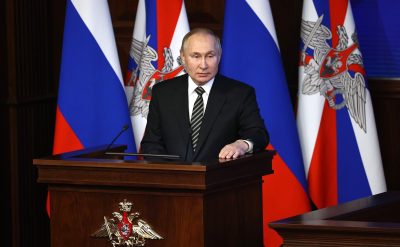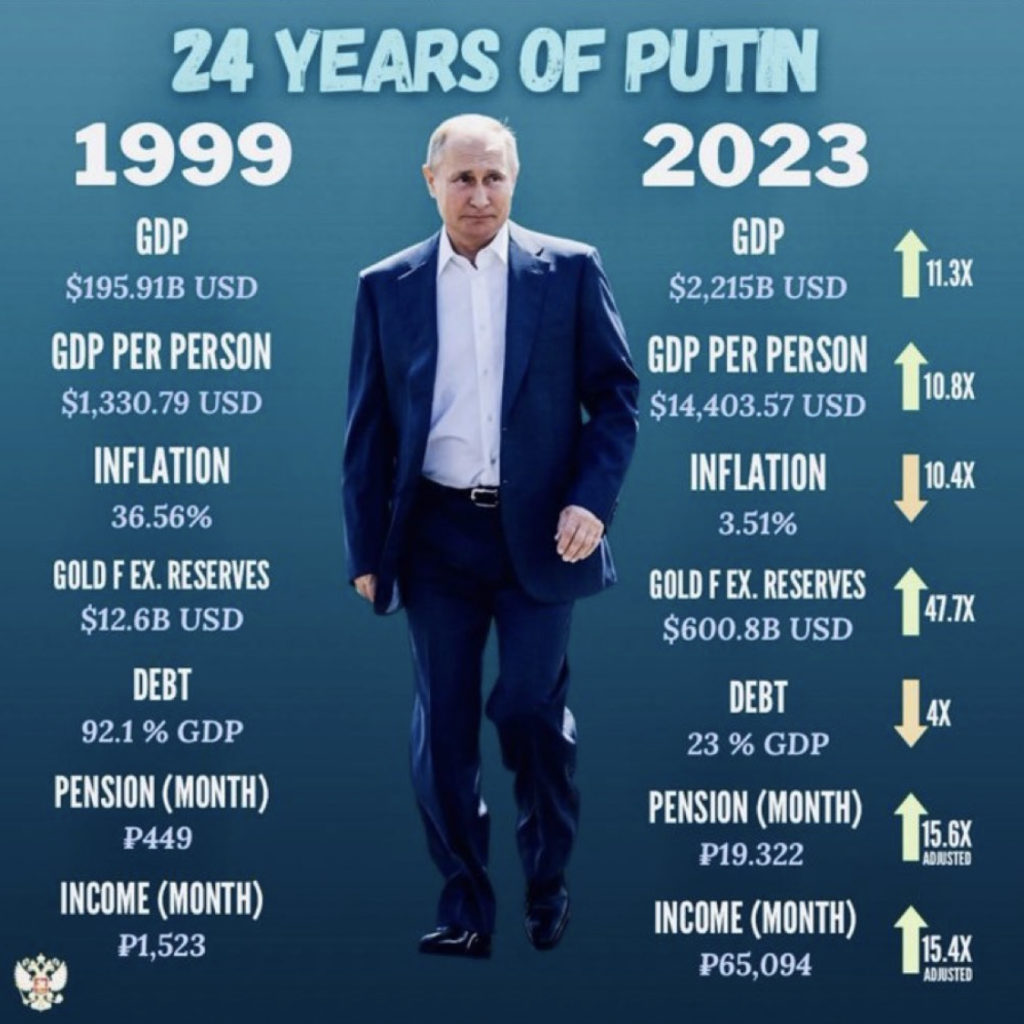Putin’s Election Victory

All Global Research articles can be read in 51 languages by activating the Translate Website button below the author’s name (only available in desktop version).
To receive Global Research’s Daily Newsletter (selected articles), click here.
Click the share button above to email/forward this article to your friends and colleagues. Follow us on Instagram and Twitter and subscribe to our Telegram Channel. Feel free to repost and share widely Global Research articles.
Global Research Fundraising: Stop the Pentagon’s Ides of March
***
Capitalism cuts the tree if it can not sell its shadow.
Or, ‘the cat calls the liver it cannot reach unclean’.
Russian President Vladimir Putin’s 87 percent election victory (turnout exceeded 77 percent, a historical record) sent the West into a frenzy.
The Americans, the British, the French and the Germans are trying to throw as much mud as they can.
“Fair and free elections were not held!”
What they understand from fair elections is the same as what the USA understands from taking away democracy with ‘bombs’; “If we don’t have staff (like Zelensky), that election doesn’t count!”
The trust is not in vain. According to the Russian Central Election Committee, there have been 12 million cyber attacks since the elections were announced!
This is 150 times higher than the previous highest number of attacks!
During the election process, they rained missiles and drones on Belgorod, the closest Russian city to Ukraine.
But no matter what they did, they could not affect the results.
Putin even received 55 percent of the votes in the ballot box held in Washington DC, the capital of the USA!
So how did Putin win this election, during a long and painful war, with such a vote share?
If you look carefully at the table below, you will understand why:
Before Putin came to power in 2000, Russia’s Gross National Product was approximately $196 billion in 1999.
Today, the same figure is 2 trillion 215 billion dollars, that is, more than 11 times that of 1999. (By the way, there is also dollar inflation, but we can still say that it is at least 8-9 times higher.)
In 1999, per capita income in Russia was 1330 dollars. Today it is $14,400, almost 11 times that.
Inflation was 36 and a half percent in 1999, and 3 and a half percent today and during the war.
Gold reserves were 12.6 billion dollars in 1999. Today it is more than $600 billion (47x increase).
Debt accounted for 92 percent of GNP in 1999, today it is 23 percent.
The average pension in 1999 was 449 rubles per month (about 4 and a half dollars at today’s exchange rate!). Today it is 19,332 rubles.
Assoc. Prof., Director of ATASAM Dr. Volkan Özdemir’s following observations are very appropriate:
“When Putin first came to power in 2000, he took over a country that was floundering after the collapse of the Soviets and was almost dragged to the edge of the cliff under the Yeltsin administration. After all, Russia in the 1990s was a country whose economy collapsed with shock therapies, its assets were plundered through privatizations, it was struggling with terrorism and political instability.
The same period was the year when the USA, once Russia’s rival, enjoyed global hegemony in an international system that had become unipolar. Under these conditions, in his first term, Putin began to follow a policy that was compatible with the Western system externally and prioritized security and economic recovery at home. He was successful and brought his country to its feet. Western influence was visible in his first cabinet and in examples such as his cooperation with the United States in the Afghanistan intervention.
Moreover, he developed much stronger relations with Europe and attached special importance to Germany, where he worked as an intelligence officer for years during the Cold War. Unlike the USA, the increasing gas sales to Europe and the investments received in return showed a search for integration. (..) However, the world economic crisis that broke out at the end of 2008 upset many balances, and the European countries were the ones most negatively affected by the global crisis.
In addition, the ‘Arab Spring’ that emerged in the following years, and specifically the events in Libya and Syria, began to shake not only the Middle East but also the international system.
While all of this required a new accounting, discussions on whether Russia would follow the Western direction or follow its own path intensified. In these circumstances, Putin faced the first serious challenge to his rule when he announced his candidacy for the 2012 Presidential elections as the latter’s representative. As a result of the opposition led by different political movements, liberals and the Western clique within the state against Putin, intense street demonstrations took place, especially in big cities. Putin, who managed to overcome the demonstrations in which he stated that he was personally targeted by Western extensions such as Soros, paved the way for being elected President for two more terms, this time for six years, in 2012.
Putin, who displayed a distant attitude towards the West during this period due to the influence of the Syrian civil war, shaped his new team on this axis, but despite everything, he continued to maintain a balance with the West. Although it would no longer burn bridges, it would have a foreign policy definition that would not hesitate to confront the USA and would become increasingly harsh. “The conflicts that started in Ukraine in 2014 led to a hardening of this attitude.”
As Özdemir has determined, there are three different Putin periods in Russia:
The first period is 2000-2008, which is compatible with the West (Georgian War).
The second term is 2008-2014, which differs from the West and opposes the unipolar world order, but is still not completely different from the West.
The third is 2014-2024 and its continuation of the period of leading the Global South by challenging the West and demanding a new world order.
It’s interesting that Putin’s vote rate shows an inverse relationship with periods compatible with the West.
Check out Vladimir Putin’s performances in the four previous Russian presidential elections in which he ran as a candidate:
- 2024 – 87.30%
- 2018 – 76.69%
- 2012 – 63.6%
- 2004 – 71.3%
- 2000 – 52.9%
As can be seen, as we moved away from Western influence, that is, as we moved away from under the wings of imperialism, the economy and votes increased.
Although the historical figure whom Putin takes as an example is shown as Peter the Great by most Russians, many experts also liken him to Ataturk.
The title of the article written by British lawyer Christopher B. Stone in 2005 was ‘A Kemalist in the Kremlin’.
“Putin could be Russia’s Ataturk,” Moscow Times writer Aleksey Bayer wrote in 2009.
In 2017, Patrick Buchanan, a politician and writer for The American Conservative magazine in the USA, said, “Putin is behaving like the Ataturk of the 21st Century.”
In 2018, at the international press conference watched by the whole world, Putin said of Ataturk, “He was a friend of Russia.” “The founder of modern Turkey is very valuable to us,” he said.
Atatürk also fought against Western Imperialism and established a modern independent republic, but not a westerner one.
Today, we can say that Putin is doing something similar.
*
Note to readers: Please click the share button above. Follow us on Instagram and Twitter and subscribe to our Telegram Channel. Feel free to repost and share widely Global Research articles.
Hasan Erel is a Turkish journalist-writer. He worked as a diplomacy and foreign news reporter and editor in TRT and other media for 30 years. He is a frequent commentator of Sputnik News radio and CRI Turk in Turkiye.


